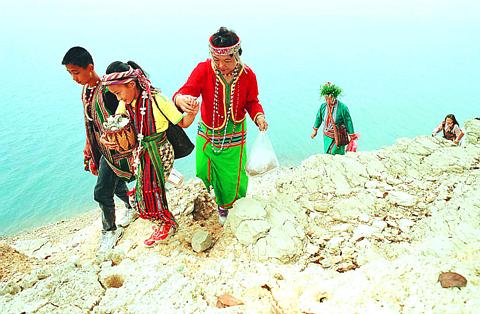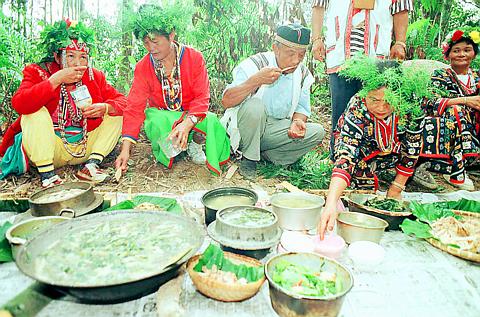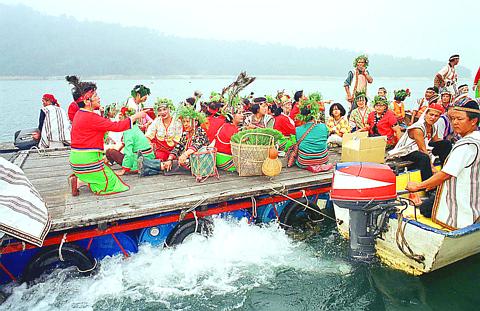Wearing traditional costumes and performing age-old rituals, nearly 200 Aboriginal people from the Thao tribe -- the smallest Abo-riginal group on the island -- returned to their ancestral land yesterday, celebrating what they described as a "rebirth" of their tribal culture.
Women sang loudly together with tears in their eyes. They sprinkled rice wine on the ground to inform the gods of their arrival.
"After 50 years of fighting, we are finally returning to our own land," said one Thao.

PHOTO GEORGE TSORNG, TAIPEI TIMES
Since the Japanese occupa-tion, the Thao have lived in the Tehua community area on the shore of Sun Moon Lake, near the epicenter of the devastating 921 earthquake. The quake destroyed most of the hotels and tourist spots around the lake and also caused serious damage to the Thao community at Tehua. At least 180 houses in the village collapsed, 95 percent of which belonged to the Thaos. Most of the tribe's 283 members have also been left unemployed by the quake.
This, they said yesterday, was the main reason for the "land-return" ceremony. They said now that their homes were destroyed, they are now going back to where their roots are.
The ceremony took place in a religious as well as political atmosphere. Garlands were placed on the heads of the 200 villagers. Then, singing together, they took a raft across a small bay out onto a nearby peninsula -- called Puzi -- that is their traditional homeland. After the 10 minute ride from the Tehua community, shouts and cheers went up as they landed. "Piakalinkin!" they shouted, meaning peace and safety.

PHOTO GEORGE TSORNG, TAIPEI TIMES
"We Thao people like to be close to nature. That's why we wear garlands on our heads," said Mani, a Thao woman in her 60s.
Fifty years ago, the tribe -- which numbered around 900 at that time -- lived in an area on the southern shore of Sun Moon Lake they call Puzi -- the Thao word for `white.' For two hundred years the Thao grew rice on the fertile flats, hunting and fishing locally and living quietly isolated from the rest of Taiwan.
But plans by Taiwan's Japanese occupiers to turn the natural lake into a reservoir to feed a hydro-electric plant meant much of the Thao's low-lying homeland would be flooded. The tribe were moved to new land to the south-east of the lake at what is now the Tehua community. They were not given any choice in the matter. Generations later, their traditional tribal culture has been diluted by Taiwanese and Chinese culture, and their population reduced to only 283.

PHOTO GEORGE TSORNG, TAIPEI TIMES
When the KMT "liberated" Taiwan, they moved into the area, developing the lake into what is now the island's most popular tourist destination.
"They [the KMT government] let the Han [Taiwanese] move here and integrate with our people," said Panu Kapamumu, the director of the Association for the Cultural Development for Thao People.
Panu believes this was a major step toward the destruction of Thao culture.
"They did not take us seriously, they just wanted us to dance and sing," he said.
Thao is still not recognized as an official Aboriginal tribe by the government, because it was long thought to be a sub-division of the Tsou tribe by anthropologists.
But villagers said the government took advantage of their culture while politically ignoring their status and rights.
The vanishing of their language is a major indicator of this loss of culture, as few people under the age of 45 speak the tribal language anymore.
Panu said yesterday that the ceremony represented "a chance for our people to trace our culture back toward the source."
After arriving at Puzi, senior villagers and spiritualists of the tribe started to identify old defense works and ancestral tombs, reaffirming the connection between the land and the Thao tribe.
"We are planning to resettle here now and restore our culture here," said Panu.
Villagers then started fires and made traditional rice cooking containers from fresh bamboo cut nearby.
With everyone lending a hand, villagers enjoyed the traditional Thao meal and rice wine. They decided to camp on the site, to sleep where their ancestors slept -- to sleep at home again.

CHAOS: Iranians took to the streets playing celebratory music after reports of Khamenei’s death on Saturday, while mourners also gathered in Tehran yesterday Iranian Supreme Leader Ayatollah Ali Khamenei was killed in a major attack on Iran launched by Israel and the US, throwing the future of the Islamic republic into doubt and raising the risk of regional instability. Iranian state television and the state-run IRNA news agency announced the 86-year-old’s death early yesterday. US President Donald Trump said it gave Iranians their “greatest chance” to “take back” their country. The announcements came after a joint US and Israeli aerial bombardment that targeted Iranian military and governmental sites. Trump said the “heavy and pinpoint bombing” would continue through the week or as long

TRUST: The KMT said it respected the US’ timing and considerations, and hoped it would continue to honor its commitments to helping Taiwan bolster its defenses and deterrence US President Donald Trump is delaying a multibillion-dollar arms sale to Taiwan to ensure his visit to Beijing is successful, a New York Times report said. The weapons sales package has stalled in the US Department of State, the report said, citing US officials it did not identify. The White House has told agencies not to push forward ahead of Trump’s meeting with Chinese President Xi Jinping (習近平), it said. The two last month held a phone call to discuss trade and geopolitical flashpoints ahead of the summit. Xi raised the Taiwan issue and urged the US to handle arms sales to

State-run CPC Corp, Taiwan (CPC, 台灣中油) yesterday said that it had confirmed on Saturday night with its liquefied natural gas (LNG) and crude oil suppliers that shipments are proceeding as scheduled and that domestic supplies remain unaffected. The CPC yesterday announced the gasoline and diesel prices will rise by NT$0.2 and NT$0.4 per liter, respectively, starting Monday, citing Middle East tensions and blizzards in the eastern United States. CPC also iterated it has been reducing the proportion of crude oil imports from the Middle East and diversifying its supply sources in the past few years in response to geopolitical risks, expanding

Pro-democracy media tycoon Jimmy Lai’s (黎智英) fraud conviction and prison sentence were yesterday overturned by a Hong Kong court, in a surprise legal decision that comes soon after Lai was jailed for 20 years on a separate national security charge. Judges Jeremy Poon (潘兆初), Anthea Pang (彭寶琴) and Derek Pang (彭偉昌) said in the judgement that they allowed the appeal from Lai, and another defendant in the case, to proceed, as a lower court judge had “erred.” “The Court of Appeal gave them leave to appeal against their conviction, allowed their appeals, quashed the convictions and set aside the sentences,” the judges